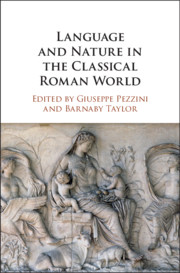Book contents
- Language and Nature in the Classical Roman World
- Language and Nature in the Classical Roman World
- Copyright page
- Contents
- Contributors
- Acknowledgements
- Abbreviations
- Introduction: First Thoughts on Language and Nature
- Chapter 1 Posidonius’ Linguistic Naturalism and Its Philosophical Pedigree
- Chapter 2 Lucilius on Latin Spelling, Grammar, and Usage
- Chapter 3 Nigidius Figulus’ Naturalism
- Chapter 4 Naturalism in Morphology
- Chapter 5 What’s Hecuba to Him?
- Chapter 6 Linguistic Naturalism in Cicero’s Academica
- Chapter 7 Linguistic Naturalism and Natural Style
- Chapter 8 Natural Law and Natural Language in the First Century BCE
- Bibliography
- Index Locorum
- Index Nominum et Rerum
Chapter 8 - Natural Law and Natural Language in the First Century BCE
Published online by Cambridge University Press: 05 June 2019
- Language and Nature in the Classical Roman World
- Language and Nature in the Classical Roman World
- Copyright page
- Contents
- Contributors
- Acknowledgements
- Abbreviations
- Introduction: First Thoughts on Language and Nature
- Chapter 1 Posidonius’ Linguistic Naturalism and Its Philosophical Pedigree
- Chapter 2 Lucilius on Latin Spelling, Grammar, and Usage
- Chapter 3 Nigidius Figulus’ Naturalism
- Chapter 4 Naturalism in Morphology
- Chapter 5 What’s Hecuba to Him?
- Chapter 6 Linguistic Naturalism in Cicero’s Academica
- Chapter 7 Linguistic Naturalism and Natural Style
- Chapter 8 Natural Law and Natural Language in the First Century BCE
- Bibliography
- Index Locorum
- Index Nominum et Rerum
Summary
The various chapters in this volume have shown how ubiquitous is the appeal to nature in writings about language in the first century BCE; several of them have explored further the place of linguistic naturalism in the overall structure of the philosophies, notably Stoicism, on which that naturalism was based. At the same time, however, even a rapid survey of the volume shows equally clearly not only how inconsistent the various claims about the relationship between nature and language are among one another – scarcely surprising, since they derive from widely divergent philosophical systems – but also how inconsistent the most important surviving text, Varro’s De lingua Latina, is in itself. Does naturalism have any meaning? Or rather, does ‘nature’ have any meaning? And what good is an appeal to nature if that nature is in itself as uncertain and unintelligible as it often seems to be?
- Type
- Chapter
- Information
- Language and Nature in the Classical Roman World , pp. 191 - 211Publisher: Cambridge University PressPrint publication year: 2019
- 2
- Cited by



